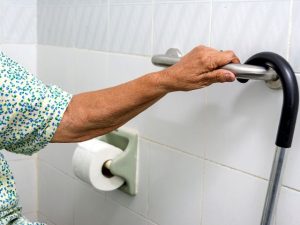Why Do Elderly Patients Fall?
As patients age, they may experience stiffened joints, decreased muscle strength, and impaired judgment.
This increases the likelihood of falls. The strongest risk factors are previous falls, weakness, balance impairments, and certain medications.
Medications that are used for sleep or have a side effect of drowsiness also increase the likelihood of falls.
Along with these risk factors there are also several medical conditions that can increase the likelihood of falling:
Diabetes
If the patient has a diagnosis of diabetes, it is important to closely monitor blood sugar levels. Especially if blood sugar levels fall too low, the patient is at an increased risk of falling. Low blood sugar causes weakness, fatigue, and a patient can faint.
If the patient’s blood sugar is low, make sure they are given a snack and stay seated until their blood sugar is rechecked after they eat.
Parkinson’s
Parkinson’s disease is a disease of the nervous system. Patients with Parkinson’s have involuntary movements such as tremors which can cause them to be unsteady and more prone to falls. There are medications to help minimize the symptoms of Parkinson’s, but it is still important to observe for unsteady gait in these patient’s and aid as needed.
Alzheimer’s & Dementia
If the patient has memory loss they can frequently forget where they are or what they are doing which can make them more prone to falls. Patients with memory loss often wander and get up frequently. It is important to re-orientate them to their environment as much as possible and to complete frequent checks on them.








